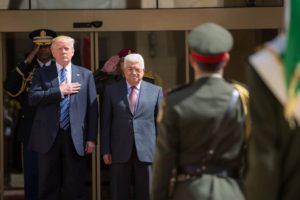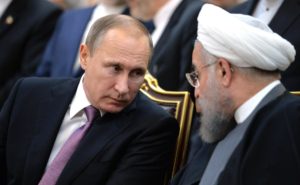Trump Tumbles into Saudi-Israeli Trap
President Trump has fallen into a Saudi-Israeli trap that won’t solve the Mideast regional conflicts and won’t lead to a peaceful resolution of the Israeli-Palestinian conflict, explains ex-British diplomat Alastair Crooke.
Jared Kushner did his father-in-law few favors when he enticed President Trump into the endless Israeli-Palestinian “peace process.” To this end, as one Israeli journalist put it, Trump’s advisers set up the Saudis to “embrace [him], and do the sword dance around [him], add a huge check for the arms deals – and [in return is expected to] create an anti-Shiite, anti-Iranian axis [around them].”

Senior White House Adviser Jared Kushner, and his wife, Assistant to the President Ivanka Trump, U.S. Commerce Secretary Wilbur Ross, U.S. Secretary of State Rex Tillerson, and White House Chief of Staff Reince Priebus are seen as they arrive at the Murabba Palace in Saudi Arabia on May 20, 2017, in Riyadh, Saudi Arabia. (Official White House Photo by Shealah Craighead)
Yes, the iconic salesman (Trump), was himself sold a proverbial “bridge” (by his son-in-law, fueled by the conceit that having known Israeli Prime Minister Benjamin Netanyahu for many years, Kushner was “ideal” for bringing peace to Israel). Trump in Riyadh thus paid full homage to the Sunni narrative that they – the Sunnis – are the innocent victims, and the Shi’a, the dark, nefarious, revolutionary, fifth-columnists, who must be driven back into their “pen.”
Trump has thus declared himself an explicit partisan in the geo-strategic power plays between the region’s northern-tier states and the Gulf states. Instead of remaining distant and “above” these Middle East conflicts, he has allowed himself to be persuaded to do the opposite: to dive in, on the Sunni side (perhaps partly to counterpoint with President Obama’s engagement of Iran).
Why? Well, the dollars (should they materialize), will be useful. But essentially, because Kushner persuaded his-father-in-law that flattering the Saudis and demonizing the Iranians, represented the entry price into the peacemaking process between Israel and the Palestinians, which if achieved, would constitute the Trump foreign policy “legacy” for history.
A Long-term Failure
According to the well-regarded Israeli journalist, Ben Caspit, in Maariv, “Someone in Washington studied the map and did their homework. The assessment is that this was a joint effort by Jared Kushner and Jason Greenblatt [Trump’s Special Representative for International Negotiations]. They heard from Obama’s people, and also from a few Israelis who spent all their time, energy, and health on the peace process in the last eight years, who explained to them how the smoking and explosive powder keg of the Middle East conflict needed to be approached.”

President Donald Trump poses for photos with ceremonial swordsmen on his arrival to Murabba Palace, as the guest of King Salman bin Abdulaziz Al Saud of Saudi Arabia, Saturday evening, May 20, 2017, in Riyadh, Saudi Arabia. (Official White House Photo by Shealah Craighead)
Yes, they probably spoke precisely with those “peace process” experts who have been in denial – for the last 25 years – to its manifest failure. And therefore, have been unwilling to acknowledge the four basic flaws to the Oslo principles. Instead, we repeat the same flawed approach, over and over, hoping always for a different outcome.
Europe and America have shared a settled conviction over the last decades: It is that Israel, out of its own necessity, must seek to conserve a Jewish majority within Israel. And that with time, and a growing Palestinian population, Israel will at some point have to acquiesce to a Palestinian “state,” in order to maintain that Jewish majority: that is, only by giving Palestinians their own state or somehow dispensing with a part of the Palestinian people that it controls, can Israel’s Jewish majority be preserved. This is the first principle.
This notion seems intuitively so self-evident, that most Americans and Europeans decline to question it. But the recent release of transcripts from the Israeli cabinet discussions in the wake of the Israeli victory in the 1967 Six Day War show clearly that even then, Israel leaders understood this basic dilemma: they heard the contemporary U.S. warnings about having to absorb one million captive Palestinians, but remained defiant, insisting to keep all the land that had occupied in the war.
As then-Israeli Foreign Minister Abba Eban noted at the time: “[The Americans’] feeling is yes to Jerusalem, but no to the territories. They are stressing that it would be very bad if the world gets the impression that we really intend to hold onto the entire territory.”
Assuaging the Israelis
This first proposition bequeathed to us the second principle: that of the “security-first doctrine”: that Europe and America, in insisting (to the Palestinians) that they must meet and assuage Israel’s own self-assertion of its security needs, would enable Israel to transition, with confidence, to a two-state solution.

President Donald Trump and Israeli Prime Minister Benjamin Netanyahu talk together prior to President Trump’s address, May 23, 2017, at the Israel Museum in Jerusalem. (Official White House Photo by Shealah Craighead)
This security-first narrative is persuasive – so persuasive that European and American policy has been skewed almost wholly towards the goal of security trust-building with Israel. This latter goal has been pursued à outrance — beyond even, the point at which any sovereignty residual that might remain after Israel’s assertion of its security requirements, would amount to little more than a continued occupation masquerading as a Palestinian “state.”
Yet, to the frustration of Western leaders, and despite whatever additional security was provided by the Palestinian security forces, it was never enough. Western leaders have found no solution, but to press on, insisting on yet more security co-operation and trust-building with Israel. Indeed, President Trump seems to have pursued this same line: apparently shouting and berating Palestinian leader Abu Mazen for inciting against Israel (and for giving financial support to families whose members, now prisoners, had resisted the Occupation).
But Israel has not conceded a Palestinian State — despite many opportunities over the last 25 years — and does not seem any more disposed to “give” a Palestinian state now. Seldom is it asked why, if the logic is indeed so compelling, have two states not emerged?
Perhaps it is because both the original “Israel surely wants a Palestinian state” premise, and the linked premise that building security trust with Israel is the necessary sine qua non to Israel’s transition into the two-state solution, quite simply, are flawed. Perhaps Israel has always hankered after some alternative way to retain the land, and somehow to contain its population (the recently released records of the post-war cabinet certainly suggest so).
The Two-State Mirage
The evidence of Israeli actions on the ground, too, plainly does not support the contention that Israel has been preparing the transition to a two-state solution of fixed borders, and a sovereign Palestinian state. On the contrary, the evidence points in the opposite direction: that Israel has been intent on frustrating the two-state solution within fixed borders.

President Donald Trump participates in arrival ceremonies with President Mahmoud Abbas of the Palestinian Authority at the Presidential Palace, May 23, 2017, in Bethlehem. (Official White House Photo by Shealah Craighead)
But there are two further “givens” to the “process” with Israel that also deserve more critical scrutiny: One, (most favored by the Europeans), is that America can “impose” a solution on Israel. On the basis of my experience as a staff member of Sen. George Mitchell’s peacemaking process, this also is a flawed premise. To appropriate the phrase used in a different context, Israel always “has six ways from Sunday” to circumvent American pressures (which in any case are limited by domestic political considerations).
Finally, does the Arab leadership – as opposed to the street – really want a Palestinian state? I am not so sure. I think they are quite comfortable with things just as they are. The presumption of a strong desire to establish a Palestinian State may be flawed too.
So what is Trump’s (or Kushner’s) “new” plan? Daniel Serioti of Israel Hayom reports on May 24: “A senior official in Ramallah told Israel Hayom that during President Trump’s one-on-one meeting with Palestinian Authority Chairman Abu Mazen … that [Trump] intends to lead a peace process based primarily on the Saudi-Arab peace initiative …
“President Trump told the PA chairman that the peace plan that he was consolidating would be based on promoting a comprehensive regional plan first, as part of the Arab peace initiative. The Palestinian official said that President Trump emphatically told Abu Mazen that this did not mean renouncing the two-state vision as the basis for a future agreement between Israel and the PA, under which a Palestinian state would be established alongside Israel, although the American president would like to consider additional possibilities ‘outside the box.’
“The main possibility is promoting the Saudi-Arab peace initiative first, and only afterwards an interim agreement, in the framework of which the parties would discuss ways to reach a permanent status arrangement that would enable the creation of an independent Palestinian state and both sides declaring an end to the Israeli-Palestinian conflict.
“The Palestinian official said that President Trump described the fundamentals of the plan that he is drafting in a very general way and did not go into the particulars, although according to him, the Americans would like to promote the Arab peace initiative so that the beginning will involve an act of normalizing Israel’s relations with the moderate Sunni Arab states.
“Additionally … the Americans will take action to promote direct intensive negotiations between Israel and the Palestinians, which will be outlined in a preset timetable, and under which the parties will take action to resolve core issues, primarily delineating the borders of the future Palestinian state, the status of Jerusalem and the holy places, the fate of the settlements outside the large blocs, the right of return and more.”
Not Much ‘New’
The “new” twist here is a “regional (Sunni-Israeli) alliance” that would initially normalize with Israel, but which then could evolve into a “regional defense alliance,” “under American patronage and with full military and diplomatic American support” and which would be targeted explicitly at Iran and its allies.

President Trump shakes the hand of Saudi Deputy Crown Prince and Defense Minister Mohammad bin Salman on May 20, 2017. (Screenshot from Whitehouse.gov)
But there is nothing truly new here. We have had “inside-out” and “outside-in” initiatives before. But what is different about the Trump/Kushner version is that the late Saudi King Abdullah’s initiative was predicated on Israel establishing a Palestinian State first and normalization with Israel occurring secondly. Trump seems to be inverting the order: Arab normalization first and then an interim agreement with the Palestinians second.
In fact, it all sounds rather like a re-make of the “security-first doctrine”: i.e. that Arab States, by assuaging Israel’s own self-assertion of its security anxieties, would serve, through normalization, to enable Israel to transition with greater confidence to an “interim” Palestinian solution – and maybe even to a permanent solution.
We have here the eternal problem that the Arab leaders cannot afford to normalize without an Israeli concession to the Palestinians, and the Palestinians in turn will not make a gesture, until and unless, Israel halts settlement building, which the latter will not do.
Another reason to think that this plan will come to nothing (after being spun out as long as possible by Prime Minister Netanyahu) is that, while it is true that the Palestinians presently are weak and divided – paradoxically Netanyahu is even weaker. Any concessions to Abu Mazen, however banal, could bring down his government. Netanyahu’s right-wing sees no reason to make any – even symbolic – concessions to the Palestinians. Why should they? They are on the cusp of having it all.
The Trap Closes
This – the Sunni-Israeli regional Alliance; the renewed peace process – is a trap into which Trump has been persuaded to enter. It is a trap, because once entered into, the peace process becomes formaldehyde to all other political processes. How often have we been told “you can’t do this; you can’t do that” because it might endanger the (vacuous) “peace process.”

Iranian President Hassan Rouhani meets with Russian President Vladimir Putin on Nov. 23, 2015 Tehran. (Photo from: http://en.kremlin.ru)
A peace process gives Israel huge anesthetic leverage in the region – as always it has so done. It is a trap – because it ties Trump into trying to assuage the Irano-phobia of Saudi Arabia, which will prove to be just as insatiable as are Israel’s “security needs.”
These liabilities will undercut Trump’s possibilities for defeating ISIS and for détente with Russia. Russia has been trying to bring the Shi’a and the Turks to the negotiating table on Syria. Trump’s role was to be to help bring the Sunni side to the table – in order to forge a wider regional settlement. That will be less likely now, as Saudi Arabia levers Trump’s visit towards weakening Iran.
With Trump’s homage to the Sunni cause, it is more likely that the Sunni-Shi’a fissure will deepen, rather than its sore edges be reconciled. And, viewed from a pure realpolitik perspective, does Trump really believe that Saudi Arabia and its allies will succeed in weakening the Russia, Iran, Syria, Iraq and Hizbullah alliance?
And Israel? The writing was plainly on the wall, as we now know, at those post-Six Day War Israeli cabinet meetings. The Americans did warn the Israeli cabinet that it would become progressively harder and harder for America to defend Israel’s hold over the disempowered, disenfranchised and dispossessed (and enlarging), Palestinian people – if Israel insisted on its “winner takes all” end of war policy.
This is something that still has to play out in its own way. But as White House adviser Steve Bannon noted in his film Generation Zero, “the essence of Greek tragedy is that it is not like a traffic accident, where somebody dies. The Greek sense is that tragedy is where something happens because it has to happen … Because the people involved make it happen. And they have no choice, but to make it happen.”
Alastair Crooke is a former British diplomat who was a senior figure in British intelligence and in European Union diplomacy. He is the founder and director of the Conflicts Forum.
https://consortiumnews.com/2017/06/03/trump-tumbles-into-saudi-israeli-trap/
https://consortiumnews.com/2017/06/03/trump-tumbles-into-saudi-israeli-trap/



Geen opmerkingen:
Een reactie posten